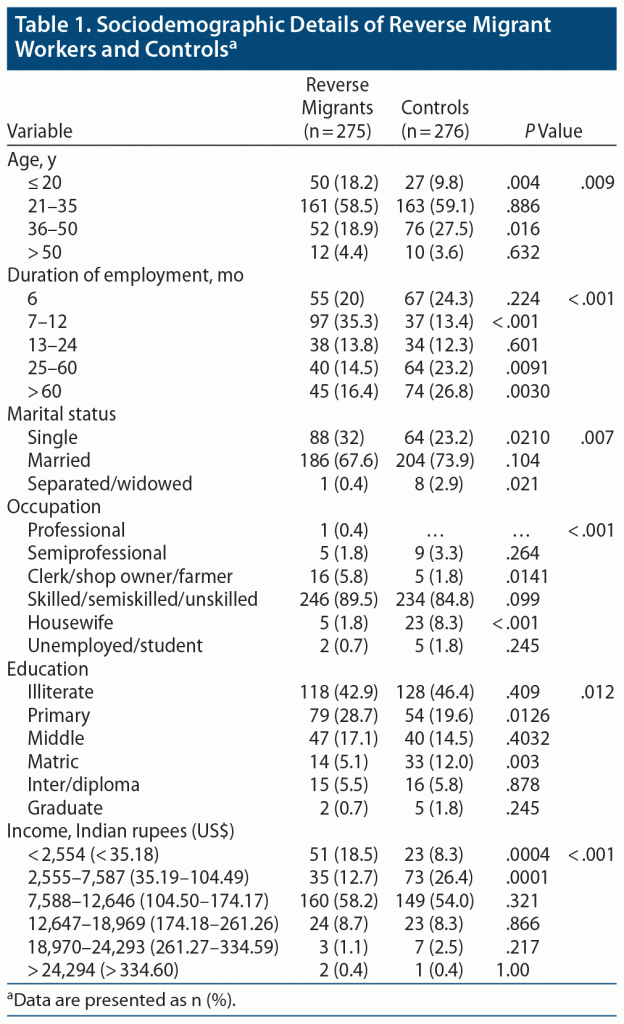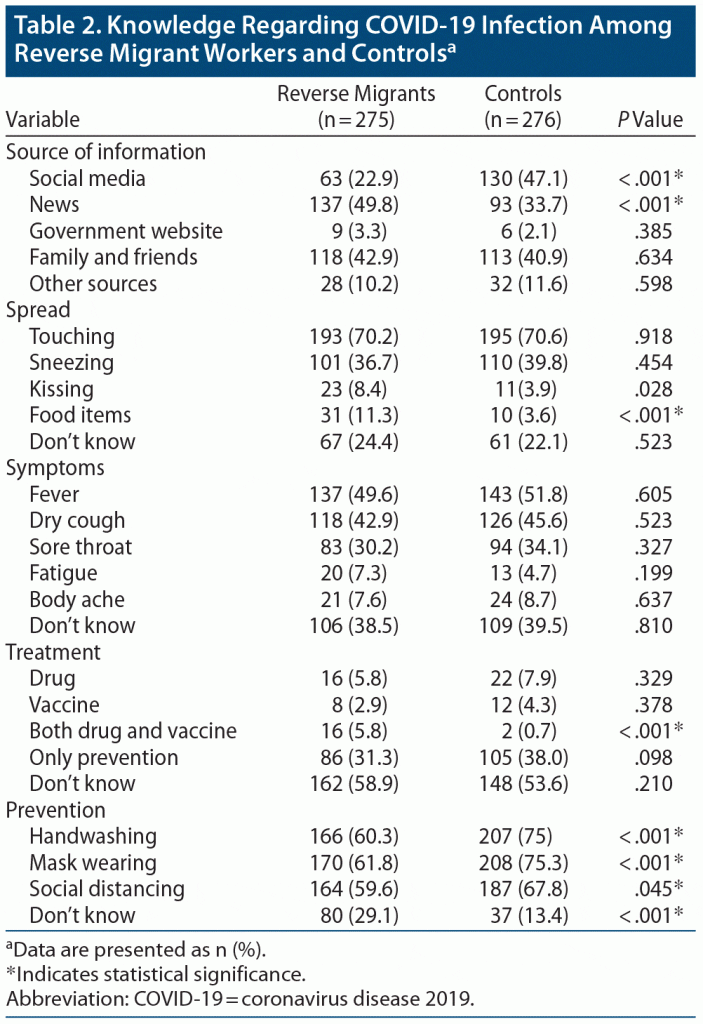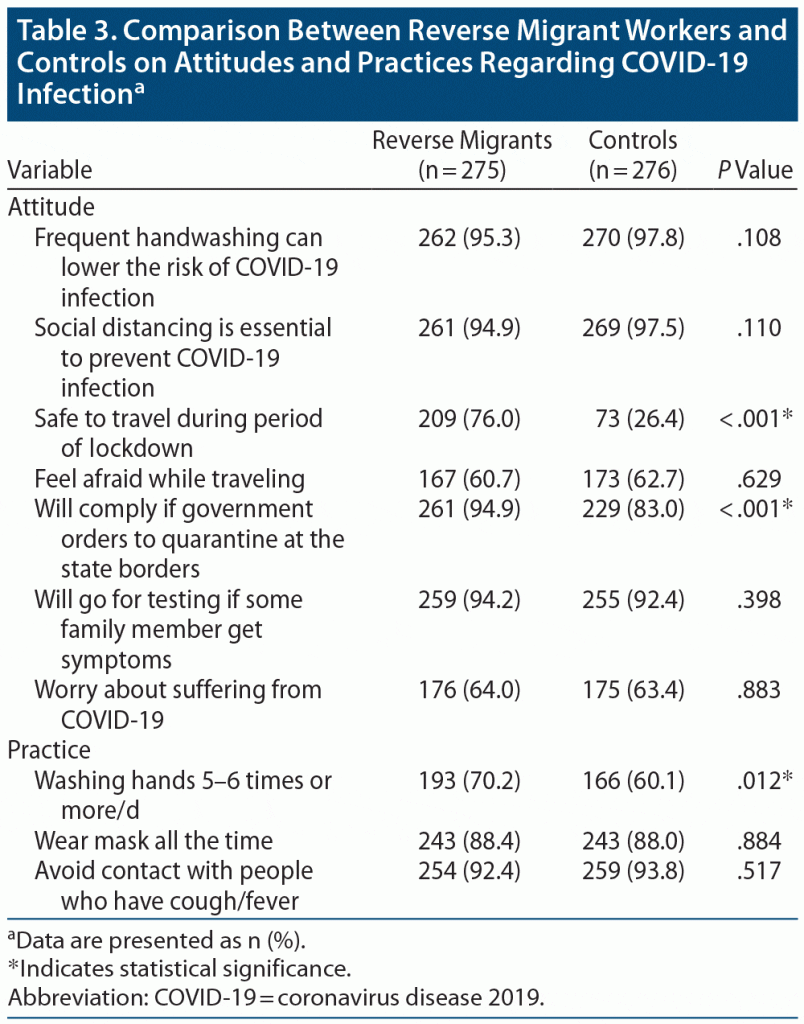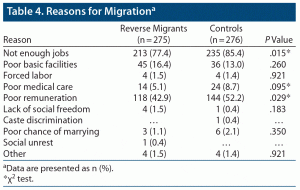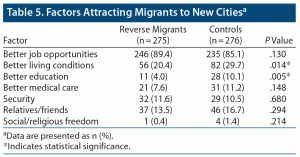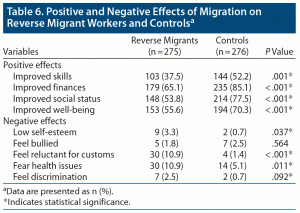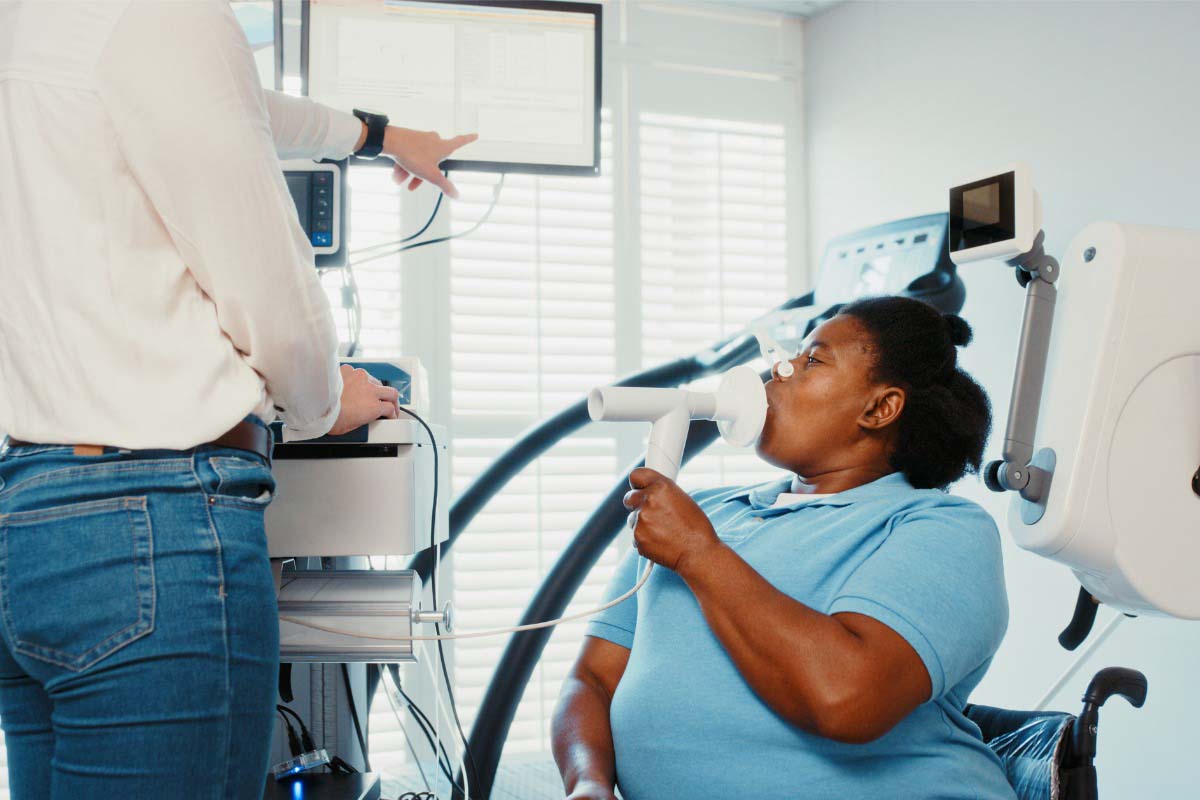ABSTRACT
Objective: To examine the various psychosocial factors associated with reverse migration among migrant workers during the coronavirus disease 2019 (COVID-19) lockdown in India.
Methods: A cross-sectional multicenter study was conducted at 4 sites in Northwest India. The migrant workers were recruited from various shelter homes, and information was gathered from reverse migrant workers and controls using various tools including a sociodemographic profile; knowledge, attitudes, and practices questionnaire; and reasons for migration and reverse migration questionnaires. A total of 275 reverse migrant workers and 276 controls participated in the study.
Results: There was a considerable difference between reverse migrant workers and controls regarding the question of whether it was safe to travel during lockdown (76.0% vs 26.4%, respectively). The most common route of spread of COVID-19 infection was through touching and sneezing, and symptoms were fever, dry cough, and sore throat in both groups. Reverse migrant workers had low self-esteem and were reluctant to participate in customs of their migration city. A large number of reverse migrant workers reported that they had no money to survive, worried about family back home at their village, felt pressured by family members to come back to the village, and had been terminated from their job.
Conclusions: Reverse migrant workers had the attitude that it was safe to travel during the lockdown. About one-fifth of the reverse migrant workers reported no place to live and fear of getting an infection. The reverse migrant workers also reported feeling low and gloomy, restless, and uncertain about the future and fear of death. Lack of jobs was a major factor driving migrant workers from their native homes.
Prim Care Companion CNS Disord 2021;23(2):20m02810
To cite: Chavan BS, Sidana A, Arun P, et al. Factors leading to reverse migration among migrant workers during the COVID-19 pandemic: a multicenter study from Northwest India. Prim Care Companion CNS Disord. 2021;23(2):20m02810.
To share: https://doi.org/10.4088/PCC.20m02810
© Copyright 2021 Physicians Postgraduate Press, Inc.
aDepartment of Psychiatry, Government Medical College and Hospital, Chandigarh, India
bDepartment of Community Medicine, Government Medical College and Hospital, Chandigarh, India
cDepartment of Psychiatry, SMS Medical College, Jaipur, Rajasthan, India
dDepartment of Psychiatry, AIIMS, Bathinda, Punjab, India
eHealth Department, Panchkula, Haryana, India
fDepartment of Community Medicine, AIIMS, Bathinda, Punjab, India
gCorona sena, Panchkula, Haryana, India
hSMS Medical College, Jaipur, Rajasthan, India
*Corresponding author: Gurvinder Pal Singh, MD, Department of Psychiatry, Government Medical College and Hospital, Chandigarh, India 160030 ([email protected]).
Reverse migration is defined as the movement of people from a place of employment to their native homes.1 In an era of increased globalization, reverse migration among migrant workers is becoming frequent. Poverty-induced rural-urban reverse migration has led to a demographic explosion and urbanization in India. Previously, research2 reported on socioeconomic and environmental problems faced by migrant workers. Migrant workers are regarded as a vulnerable population who move around a lot and have many psychosocial issues related to their reverse migration. A national lockdown was declared in India on March 25, 2020 during the coronavirus disease 2019 (COVID-19) pandemic. The lockdown encompassed the entire country, and citizens were not even allowed to step out of their houses. Migrant workers were the population most affected by the extended lockdown.3 The migrant workers who were suddenly rendered jobless had no choice but to return to their native homes. More than 21,600 shelter/relief camps were set up in India for migrant workers.4
Migrant workers are an integral part of the dynamically changing Indian urban landscape. Although there is work by Virupaksha et al5 on the reasons for migration, there is a knowledge gap with regard to the reasons for mass reverse migration. Job loss and inability to meet daily livelihood may not be the only reasons for reverse migration. In the absence of any public transportation, migrant workers started walking to their place of origin along with their children and personal belongings. Since this mass migration was unexpected, the state governments were unprepared, and there was a perceived risk of spread of COVID-19 from the cities to the villages. The challenges were complex, and the factors for reverse migration among this population have yet to be fully addressed. Hence, the objective of this study was to assess the sociodemographic characteristics of these migrant workers and determine the psychosocial factors associated with reverse migration during the lockdown imposed by the government of India during the COVID-19 pandemic.
METHODS
This was a multicenter, cross-sectional study conducted at 4 sites in Northwest India (ie, Chandigarh [Union Territory], Bathinda [Punjab], Panchkula [Haryana], and Jaipur [Rajasthan]). The participants consisted of migrant workers who were working in Chandigarh, Bathinda, Panchkula, and Jaipur for at least the last 6 months and who were in the process of returning to their native homes due to lockdown. Since there was a curfew in the country, no one was allowed to leave, and, thus, the respective state governments lodged the migrant workers in empty government buildings and community centers converted into make-shift shelter homes. The Ministry of Health and Family Welfare, Government of India asked various departments of psychiatry of tertiary health care institutions in Northwest India to provide psychosocial support to the migrant workers in the shelter homes. Thus, it was easy for the participating tertiary health care institutions to recruit the migrant workers for the study, as they had been working with them since March 25, 2020 and had developed a therapeutic relationship.
After obtaining informed consent, the participants were recruited into the study after meeting the inclusion/exclusion criteria. Reverse migrant workers who were aged >18 years and had been working for at least the last 6 months were considered for the study, and those who were willing to participate were included. In case of refusal to participate, the next in order was enrolled. Pregnant women, chronically ill and debilitated migrant workers requiring treatment for severe medical and surgical conditions, and migrant workers seeking or who had sought treatment for psychiatry problems in the last year were excluded. Migrant workers from the same geographical background but who had decided to stay in the city where they had been working rather than returning home were included as control subjects using the snowball technique. To ensure an adequate matched control sample, the study subjects were asked to identify a person from their locality who had migrated at least 6 months ago and did not plan to go back to their native home. In case of refusal of interview by a control subject, the next in order was enrolled. Participants were selected from each site. The reverse migrant workers were sampled with a simple random-sampling technique. There was no attempt to stratify as per state of origin since the majority of reverse migrant workers belonged to north Indian states with poor economic conditions. The subjects were randomly selected from a computer-generated list of contact numbers of migrant workers currently staying in temporary shelter homes. Each site enrolled 75 study subjects and 75 geographically matched controls.
The selected participants (both study subjects and controls) were assessed to collect individual and household sociodemographic details. They also completed 2 questionnaires: a knowledge, attitude, and practice questionnaire regarding the COVID-19 pandemic and a questionnaire designed to assess reasons for and effects of migration and reverse migration. Questionnaires were categorized into a subsection of personal, social, psychological, and financial components. Positive and negative effects/consequences incurred due to migration were also included in the migration and reverse migration questionnaire. Push-pull factors incorporated into the questionnaire included the positive and negative factors that were instrumental in the migration. These push-pull factors have been described previously in the literature.6 The questionnaires were developed by the first 2 authors (B.S.C. and A.S.) and were validated by 2 independent teaching medical faculty. The questionnaires included items already in the literature as well as those found to be pertinent in questionnaire validation/pilot testing. In the case of ambiguity, the item was discussed and either included or excluded. Due to time constraints, item factor analysis was not performed. Pilot testing was conducted with 50 subjects (25 study subjects and 25 controls), which were not included in the final analysis. The questionnaires were developed in Hindi, as the majority of participants were Hindi speaking.
The study was approved by the institutional research and ethics committees. The participants were not influenced or coerced. The study protocol was explained in detail to each participant, and written informed consent was taken voluntarily. Data from all 4 sites were entered in a Microsoft Excel spreadsheet and analyzed using SYSTAT software version 13.2 for Windows. Findings were summarized using frequencies, means (with standard deviation), and proportions. χ2 test and odds ratio (95% confidence interval) were used for testing of association and its strength. A P value <.05 was considered statistically significant.
RESULTS
A total of 275 reverse migrant workers and 276 controls from the 4 sites were included in the study. The mean age of the reverse migrant workers was 30.36 (10.19) years, with a range of 18–69 years, and only 31 (11.3%) were women. The median duration of employment was 12 months among reverse migrants (Table 1).
Results showed that the most common source of information was social media (WhatsApp), TV news, and family and friends for both groups. Few subjects in either group reported more than one source of information. The most common route of spread of COVID-19 infection was through touching and sneezing, and symptoms were fever, dry cough, and sore throat in both groups. More than half of the respondents in both groups were not aware of the treatment for COVID-19, and large numbers of respondents emphasized prevention through handwashing, mask wearing, and social distancing in both groups as shown in Table 2.
Table 3 provides attitudes and practices of the study participants with regard to COVID-19 infection. There was a considerable difference between reverse migrant workers and controls regarding whether it was safe to travel during lockdown (76.0% vs 26.4%), willingness to comply if the government ordered individuals to quarantine at state borders (94.9% vs 83.0%), and washing hands 5–6 times or more per day (70.2% vs 60.1%). However, responses regarding attitudes and practices were comparable in both groups for the other parameters.
Table 4 shows the reasons that study participants cited for migrating to new areas. Lack of jobs was a major factor for both reverse migrant workers (77.4%) and controls (85.4%). Poor remuneration was also a factor. Poor basic facilities such as electricity and water and daily needs were cited as reasons by both reverse migrant workers and controls. Other reasons included poor medical care, lack of freedom, and poor marital prospects. Factors that attract workers to migrate to new cities are shown in Table 5. Table 6 provides the positive and negative effects of migration. Reverse migrant workers reported significantly less positive effects of migration compared to controls. On the other hand, reverse migrant workers also reported significant rates of low self-esteem, reluctance for customs, and fear of health issues compared to controls.
Among the reverse migrant workers who were moving back to their native homes, nearly one-third cited that they had no money to survive (31.3%), worried about family back home in their village (37.1%), and were pressured by family members to return to the village (38.2%). Termination from the job by an employer was also reported by the migrant workers (12.7%). Regarding social causes for reverse migration, about one-fifth of the subjects reported that they had no place to live (20.0%), other friends had returned to their villages safely (19.6%), and they feared getting COVID-19 infection (16.4%). Psychological reasons included feeling low and gloomy (20.4%), feeling restless (19.6%), uncertainty about the future (17.8%), and fear of death (10.2%). Financial factors included the need to support family during the harvesting season (26.9%) and better job opportunities (25.4%) back home.
DISCUSSION
The current study aimed to ascertain the various sociodemographic characteristics and psychosocial factors associated with the reverse migration of migrant workers during the COVID-19 lockdown in India. Although there was no public transportation and the state government had established shelter homes in all major cities to provide basic needs, large numbers of migrant workers were traveling on foot back to their native villages, risking their lives and increasing the likelihood of taking the virus to an unaffected community. On the other hand, there were also migrant workers from the same locality who decided to stay in their migration city. Thus, it was important for our research to understand the motivations of the 2 groups.
The findings of the current study reveal that migrant workers who chose to return to their native homes despite curfew and lack of public transportation were younger, unmarried, and had lower education and monthly remuneration and had been employed for a shorter period compared to the migrant workers who chose to stay in their current location. Workers who migrate to new cities face many difficulties with regard to adjustment and integration, and access to health care facilities remains poor. A study7 from Singapore reported that migrant workers have a higher prevalence of infectious diseases (malaria, enteric fever, hepatitis A and E, and tuberculosis) compared to Singaporeans, which is attributed to the complex interplay of several factors, including higher disease prevalence in their countries of origin, socioeconomic factors, their living conditions in Singapore, and financial, language, and cultural barriers to health care access. Another similar study8 from India reported a higher incidence of skin problems among migrant construction workers.
Since the majority of migrant workers migrate to earn money to provide for family back home, they do not invest in building houses or in permanent business ventures at the place of migration. These migrant workers generally move in groups and develop their local communities for their social and recreational needs. Among the participants in the present study, the authors witnessed that there were small subgroups within the larger population of migrant workers staying in the shelter homes. The migrant workers in these small subgroups within the larger group were from common geographical areas; had similar ethnicity, customs, culture, and language; and had a leader whom they all would listen to. It is possible that a few of the migrant workers decided to return home just on the advice of a self-declared leader. Ethnicity, which included language, religion, traditions, and behavioral norms, was a major factor when deciding to reintegrate into a new community at the place of migration. If the migrant workers are from a different ethnic group than that of the place of migration, they tend to be detached from the local population and instead remain connected with their homes. This lack of integration is the major challenge that local health and social welfare services are facing with regard to delivery of services.9
In this study, we also attempted to determine the reasons for migration among the participants. The major reasons for leaving their native homes were poor basic facilities, poor employment opportunities, poor medical facilities, poor remuneration, discrimination, and social unrest at the place of origin. These factors support the push theory of migration.10 Similarly, the pull factors at the place of migration in the form of good job opportunities, better living conditions, better medical care, security, and relatives and friends already living and working in these areas were also reported by the participants. These findings are in line with the push-pull theory of migration.6,10 Surprisingly, despite having low education compared to the control group, the reverse migrant participants had adequate knowledge about COVID-19. However, they still decided to start their journey home despite the lack of public transportation. The primary source of their information was news from friends and relatives.
Another possible reason for reverse migration was the fear of safety and security at the place of migration.11 The local citizens at the place of migration might have been perceived as hostile toward the migrant workers. Because of lack of integration within the local community at the place of migration, the migrant workers remained detached, their needs regarding self-esteem and self-actualization were never met, and belongingness and love needs were limited to their small ethnic group. Thus, whenever there was a threat to physiologic and safety needs, the migrant workers felt vulnerable and the factors to keep them in their new city (investment in business, education of children, and larger community responsibility) were very weak. Further, as compared to migrant workers who decided to stay in their new city, significantly more participants in the reverse migration group were semiskilled and skilled workers. The migrant workers might have been assured of similar work back home; thus, there was nothing to lose with regard to leaving their new city.
A large number of reverse migrant workers in this study reported that they did not have money to survive, worried about family back at their village, were pressured by family members to return to their village, or were terminated from their jobs. Other reasons included no place to live, other friends had safely returned to their native village, fear of getting COVID-19, feeling low and gloomy, restlessness, uncertainty about the future, and fear of death. The available literature shows that the most common reasons for migration back to native places are nostalgia, connectedness with the native place, better job opportunities, and change in season.12
We found no study about various psychosocial and mental health issues in the reverse migrant population, but it was clear from the findings that reverse migrant workers (1) required detailed information about COVID-19 including its spread, treatment, and prevention; (2) were not as happy as their counterparts and felt low and were worried; (3) were short on money and did not have a place to live; and (4) were reluctant with regard to new customs, had health issues, and felt discrimination. The present study is the first to obtain direct information on the reasons for reverse migration among migrant workers. We recognize that our data are preliminary and have many limitations, as there are no previous data to back up our findings. Also, this was an observational study, and items analysis using factorial analysis was lacking due to time constraints. Nonetheless, an understanding of the factors influencing reverse migration among migrant workers warrants further research and has immense policy implications for health planners, social scientists, and mental health professionals. The findings of the present study could be considered in formulating any psychosocial intervention program for migrant workers.
CONCLUSION
The present study on reasons for reverse migration showed that the phenomenon of mass movement of migrant workers back to their native homes was not just due to a threat to basic needs. The reverse migrant workers had the attitude that it was safe to travel during the lockdown and that washing hands 5–6 times per day could prevent COVID-19 infection. The reverse migrant workers had low self–esteem, felt reluctant to participate in new customs, and had various health issues. In conclusion, various psychosocial issues in this vulnerable population forced them to travel back to their native homes against the government advisory, risking their lives and that of their community during the COVID-19 lockdown.
Submitted: September 5, 2020; accepted December 30, 2020.
Published online: March 25, 2021.
Potential conflicts of interest: None.
Funding/support: None.
Clinical Points
- Health education regarding the spread of COVID-19 is an important psychosocial intervention strategy for migrant workers.
- Clinicians can help reverse migrant workers by acquiring knowledge of push-pull factors of migration.
- Reverse migrant workers reported feeling low and gloomy, restless, and uncertain about the future.
References (12)

- Mukhra R, Krishan K, Kanchan T. COVID-19 sets off mass migration in India. Arch Med Res. 2020;51(7):736–738. PubMed CrossRef NLM
- 2. Firdaus G. Mental well-being of migrants in urban center of India: analyzing the role of social environment. Indian J Psychiatry. 2017;59(2):164–169. PubMed CrossRef NLM
- Dodd W, Humphries S, Patel K, et al. Determinants of internal migrant health and the healthy migrant effect in South India: a mixed methods study. BMC Int Health Hum Rights. 2017;17(1):23. PubMed CrossRef NLM
- Rashid O, Anand J, Mahale A. India coronavirus lockdown: migrant workers and their long march to uncertainty. The Hindu website. April 4, 2020:7. Accessed May 25, 2020. https://www.thehindu.com/news/national/india-coronavirus-lockdown-migrant-workers-and-their-long-march-to-uncertainty/article31251952.ece
- Virupaksha HG, Kumar A, Nirmala BP. Migration and mental health: an interface. J Nat Sci Biol Med. 2014;5(2):233–239. PubMed CrossRef NLM
- Zhang Z, Zhang T, Zhang Q. The push-pull theory of migration and its application. Chin J Popul Sci. 1997;9(3):255–26. PubMed NLM
- Sadarangani SP, Lim PL, Vasoo S. Infectious diseases and migrant worker health in Singapore: a receiving country’s perspective. J Travel Med. 2017;24(4):tax014. PubMed NLM
- Shah KR, Tiwari RR. Occupational skin problems in construction workers. Indian J Dermatol. 2010;55(4):348–351. PubMed CrossRef NLM
- Segal UA. Globalization, migration, and ethnicity. Public Health. 2019;172:135–142. PubMed CrossRef NLM
- Castelli F. Drivers of migration: why do people move? J Travel Med. 2018;25(1):tay040. PubMed NLM
- Trivedi U. India plans to regulate social media as it can cause disruption. The Economic Times news. Oct 29, 2019. Accessed November 30, 2020. https://economictimes.indiatimes.com/news/economy/policy/india-plans-to-regulate-social-media-as-it-can-cause-disruption/articleshow/71695590.cms
- Kumar K, Mehra A, Sahoo S, et al. The psychological impact of COVID-19 pandemic and lockdown on the migrant workers: a cross-sectional survey. Asian J Psychiatr. 2020;53:102252. PubMed CrossRef NLM
Enjoy this premium PDF as part of your membership benefits!
